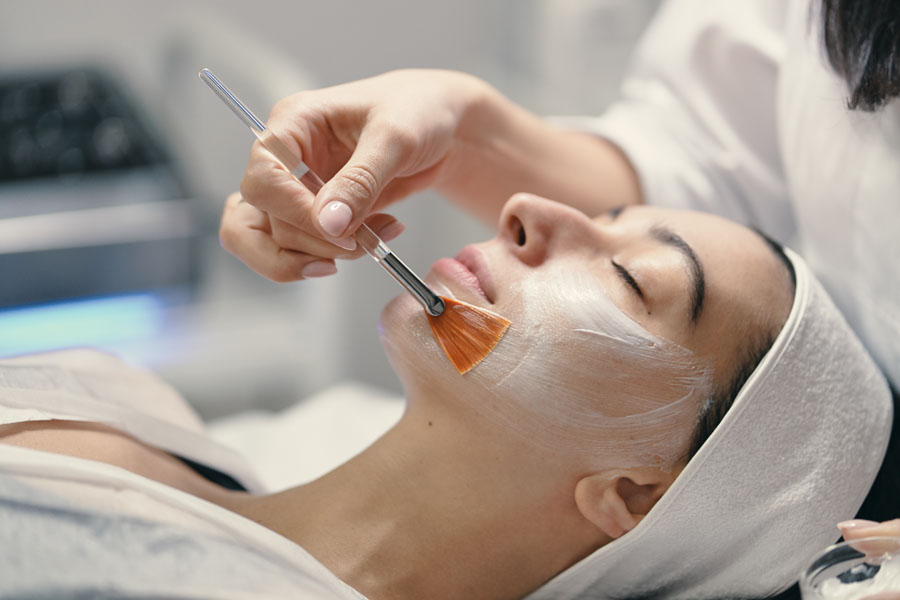Chemical peels can reduce or improve the appearance of fine lines and wrinkles, age spots, sun damage, hyperpigmentation, acne scarring, dull-looking skin and other skin imperfections, resulting in smoother and more even skin.

Chemical peels can reduce or improve the appearance of fine lines and wrinkles, age spots, sun damage, hyperpigmentation, acne scarring, dull-looking skin and other skin imperfections, resulting in smoother and more even skin.
Chemical peels work by deeply exfoliating the skin which removes old, damaged, and dead cells from the surface of the skin revealing young, healthy skin cells underneath.
Peels work by intentionally causing controlled injury to the skin. This controlled damage triggers skin regeneration and repair and stimulates the production of collagen, elastin and hyaluronic acid in the deeper layers of the skin. The new skin improves overall skin appearance, texture and hydration. In addition, each chemical peel has other benefits based on its active ingredients.
A comprehensive consultation is always undertaken to assess your suitability for treatment, understand expectations and to help formulate a customised and safe plan should you decide to go ahead with treatment.
During the consultation, you will have the opportunity to discuss any specific skin concerns you may have. The practitioner will undertake a medical history and skin assessment and ask details about your current skincare routine. Based on the assessment, the practitioner will discuss whether you are suitable for a chemical peel. If so, they will advise on the most appropriate peel for your skin type and provide their expert opinion about realistic and expected outcomes. They will also discuss the possible side effects, any risks and the procedure in detail to allow you to make an informed choice about whether you wish to have the treatment.
You are strongly encouraged to consider all the benefits and risks explained to you as part of the consultation and clarify anything you are unsure about. It is important not to rush into any decisions. Treatment will only go ahead if both you and the practitioner agree and are happy to proceed, and after you have provided written consent to treatment.
Sometimes, it is necessary to prepare the skin with specific creams before you have the peel. This usually takes around 2 weeks. It is essential you understand and carefully follow the instructions provided by the practitioner to reduce the risks of complications or side effects and maximise effectiveness of the treatment.
You will need to stop using skin products containing vitamin A derivatives (e.g. retinol, tretinoin) unless directed by your practitioner. 1-2 weeks before your treatment, you will need to avoid any chemical or physical exfoliants, exfoliating facials, waxing, hair removal creams, laser hair removal, electrolysis, excessive sun exposure and sunbed use.
The procedure will involve first removing any make-up/skin care products from the treatment area and then cleansing the skin thoroughly thereafter. The skin is then sometimes degreased to allow the active ingredients of the chemical peel to penetrate the skin fully. Next, petroleum jelly is applied with the aim to protect sensitive areas of the skin (e.g. eye area, nostrils, lips, eye brows), any piercings and permanent tattoos. The peel is then applied to the skin and left on for the desired time – this varies depending on the type of chemical peel. You may experience some stinging, discomfort, and redness or tightness of the skin. Once the time elapses, the peel is washed off. Some peels require neutralising; others need to be left on the skin for several hours and therefore need to washed off at home. Your practitioner will advise you accordingly. After the peel has been washed off, a moisturiser and sunscreen will be applied to the area.
Pre- and post-treatment photos will be taken and held by the clinic for medical documentation purposes.
Aftercare is an extremely important part of the treatment to minimise risk and ensure good results are achieved. Detailed aftercare advice will be provided at your consultation. This varies slightly depending on the type of chemical peel but will include lots of hydration, applying SPF 50+ sun protection and using fresh towels and pillowcases. Also, not touching or rubbing the skin; keeping the area clean and make-up free; and avoiding alcohol, strenuous exercise/gym, saunas and steam rooms for 24-48 hours. No prescription skin actives such as benzoyl peroxide/retinoids or botulinum toxin treatments for 14 days; and no dermal fillers, laser treatments, waxing/threading or extreme sun exposure for 28 days.
Whether you’re exploring skincare treatments, anti-ageing solutions, or advanced aesthetic procedures, we’re here to help you look and feel your best. Book your personalised consultation with our expert team at Skinology Medical Aesthetics clinics at any of our three locations in London.
| Common Skin Concerns & Treatment Options | Wrinkle Relaxing | Dermal Fillers | Chemical Peels | Microneedling | Mesotherapy | Polynucleotides | Profhilo® / Skin Boosters | Medical Grade Skin Care |
|---|---|---|---|---|---|---|---|---|
| Lines and wrinkles | ✓ | ✓ | ✓ | ✓ | ✓ | ✓ | ||
| Facial volume loss | ✓ | ✓ | ||||||
| Jowls | ✓ | ✓ | ||||||
| Laughter lines | ✓ | ✓ | ✓ | |||||
| Neck lines | ✓ | ✓ | ✓ | |||||
| Nasolabial folds | ✓ | ✓ | ||||||
| Smokers lines | ✓ | ✓ | ✓ | |||||
| Downturned smile | ✓ | ✓ | ||||||
| Gummy smile | ✓ | |||||||
| Double chin | ✓ | |||||||
| Thin lips | ✓ | |||||||
| Saggy / lax skin | ✓ | ✓ | ✓ | ✓ | ✓ | ✓ | ✓ | |
| Aged skin | ✓ | ✓ | ✓ | ✓ | ✓ | ✓ | ✓ | ✓ |
| Age spots | ✓ | ✓ | ✓ | ✓ | ||||
| Hyperpigmentation | ✓ | ✓ | ✓ | ✓ | ||||
| Melasma | ✓ | ✓ | ✓ | |||||
| Acne | ✓ | ✓ | ✓ | ✓ | ||||
| Acne Scars | ✓ | ✓ | ✓ | ✓ | ✓ | |||
| Poor texture / dull skin | ✓ | ✓ | ✓ | ✓ | ✓ | ✓ | ||
| Hollow eyes / dark circles | ✓ | ✓ | ✓ | ✓ | ✓ |

As the Founder and Clinical Director of Skinology Medical Aesthetics, my passion for dermatology started during university as an undergraduate and stemmed from my personal struggle with acne throughout my teens and early adulthood. I recall vividly the effect of having bad skin on my confidence but with the right support, I was able to love my skin and myself again.
After graduating in 1999, I started working in a large NHS teaching hospital where I was fortunate to gain experience in a wide range of clinical areas. In 2002, I chose to specialise in mental health where I practised as an independent prescribing pharmacist. In 2022, I became one of the first credentialed Consultant Pharmacists by the Royal Pharmaceutical Society (RPS), awarded to individuals who have demonstrated delivery of expert level clinical care and influenced positive change across the healthcare.
I was very nervous to get lip filler but Yogita made the whole experience very comfortable and I’m delighted with the outcome.
My skin became dull and lifeless during the menopause. Skinology personalised an easy and affordable skincare plan that’s made my skin feel rejuvenated.
I had 3 sessions of microneedling which really helped improve my acne scars.
